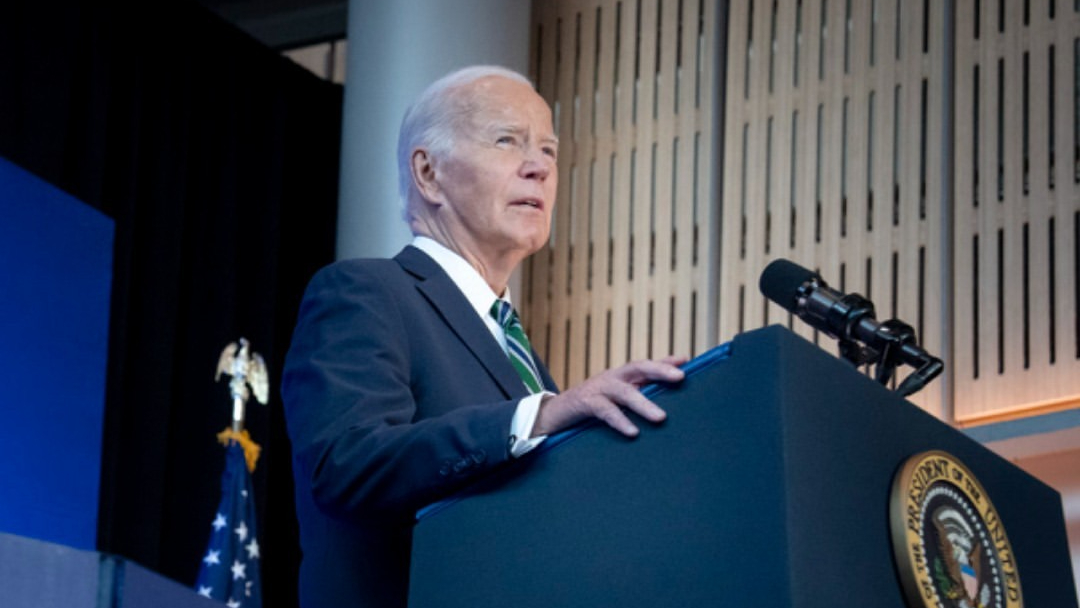Biden’s Final Turkey Pardon: A Farewell to a Beloved White House Tradition
In a ceremonial moment brimming with tradition and sentimentality, President Joe Biden officially pardoned two turkeys at the White House ahead of Thanksgiving Day this year. This act marked not just another Thanksgiving gesture, but the last turkey pardon of Biden's presidency as he nears the end of his second term. The turkeys, named Peach and Blossom, hailing from Minnesota, were given a special reprieve from becoming part of the Thanksgiving feast and were sent to a farm in the Midwest to live out the rest of their lives in peace. For the Biden administration, this marked the end of a chapter in a time-honored White House custom—a custom that brings lightheartedness and levity to a presidency often overshadowed by global crises and domestic challenges. As Biden prepares to leave office, the annual turkey pardon ceremony serves as a poignant and nostalgic reminder of a moment of tradition amid the gravitas of leading the nation.
Peach and Blossom: The Lucky Turkeys
This year’s turkeys, Peach and Blossom, were carefully selected from Minnesota, the nation’s largest turkey-producing state. These birds represent the pinnacle of turkey farming, each chosen for their size and health. The two turkeys made their way to the White House, where they were presented to President Biden, who pardoned them in a ceremonial event on the South Lawn. This ceremony, which has grown into a major fixture of American Thanksgiving celebrations, was a joyful occasion where the turkeys were given a formal reprieve, ensuring that they would not meet the fate of their counterparts on dining tables across the nation.
After the ceremony, Peach and Blossom were whisked away to a farm in the Midwest, where they will live out the rest of their lives. For those familiar with the turkey pardoning, this final step in the ceremony represents more than just a symbolic gesture—it’s an act of kindness, a break from the harsh realities of life on the farm, and a step into the public spotlight for two unsuspecting birds.
Minnesota farmers who had raised Peach and Blossom were invited to participate in the ceremony, continuing the long-standing tradition of local turkey growers being involved in the event. The selection of these turkeys serves as a tribute to the agricultural contributions of the U.S., and especially to the turkey industry in Minnesota, which supplies millions of turkeys every year for Thanksgiving dinners across the country.
The Turkey Pardoning Tradition: A Historic Gesture of Goodwill
While the turkey pardoning ceremony is now a beloved part of American Thanksgiving, its roots stretch back over a century. Though the formal act is most often associated with President John F. Kennedy’s famous 1963 pardon, the history of this custom goes back much further. Many historians trace the first turkey pardon to President Abraham Lincoln in 1863. According to popular reports, Lincoln spared a turkey's life at the request of his son Tad, who had befriended the bird and pleaded for its life. Tad's close connection to the animal, coupled with Lincoln’s affection for his son, led the president to grant the turkey its freedom, beginning what would evolve into an enduring tradition.
Over the years, several presidents have either participated in or formalized the turkey pardon. While not all presidential administrations continued the custom, the ritual gained traction over the decades and became a fixture in the Thanksgiving holiday calendar. By the time President George H.W. Bush entered office in the 1980s, the turkey pardon had gained official status, and it was under his administration that the event as we know it today was solidified as a White House tradition. The White House ceremony began attracting national media attention, and the spectacle of a president personally pardoning turkeys became a moment for families across the country to tune in, marking the beginning of the holiday season with a fun and memorable event.
Since then, presidents from both parties have continued the tradition, often using the event to connect with the American public in a more personal and approachable way. The turkey pardon provides a lighthearted contrast to the often heavy responsibilities of leading the nation, offering a moment for the president to engage with the public in a way that’s unifying and celebratory. The symbolic nature of pardoning the turkeys—spanning decades of presidential involvement—has turned the event into a moment of national recognition, especially as Thanksgiving serves as a time for Americans to reflect on the themes of family, community, and gratitude.
Biden’s Last Turkey Pardon: A Meaningful Farewell
For President Biden, this year’s turkey pardon holds special significance. It marks his final year of office and his last chance to participate in this ceremonial moment that has been a part of his administration's public life. As his presidency winds down, Biden’s farewell to the tradition highlights his desire to maintain a sense of normalcy and warmth in the face of political challenges and personal scrutiny.
This final turkey pardon serves as a bittersweet farewell to a lighter side of the presidency—a part of his leadership that allowed him to connect with the American people on a personal level. While his presidency has been defined by major legislative wins, global diplomacy, and crisis management, the turkey pardoning stands as a reminder of the little things that make the office of the president more relatable and human.
As Biden’s final turkey pardon unfolded, he used the opportunity to reflect on the themes of the holiday—gratitude and unity—and remind Americans of the importance of coming together in difficult times. In a year marked by political divisions and economic challenges, the simple act of pardoning two turkeys became a symbolic gesture of goodwill, reinforcing the message of hope and peace that is so often tied to the Thanksgiving holiday.
What’s Next for the Turkey Pardoning Tradition?
While this year’s turkey pardon marks the end of Biden’s time in office, the tradition will undoubtedly continue under future presidents, regardless of political affiliation. The turkey pardon has become so ingrained in American culture that it is no longer just about the person occupying the Oval Office but a shared national moment that transcends party lines. It is a tradition that is likely to remain a part of the White House celebrations for years to come, with each president adding their own unique touch to the event.
As Biden prepares to hand over the reins to his successor, the future of the turkey pardoning tradition is secure. Whether the next president is a Democrat or Republican, the ceremonial pardoning of turkeys will continue to offer a moment of levity and unity in a nation often embroiled in political and social debates. It is likely that the future iterations of this tradition will continue to be a reflection of the times, with each new leader finding their own way to engage the American public and carry forward this beloved custom.
A Tradition that Unites Americans
In an era when the political climate is often marked by discord and division, traditions like the turkey pardon offer a brief respite. The act of pardoning turkeys—far from a trivial gesture—is a reminder that moments of goodwill and shared joy can still exist in the public sphere. It allows people from different backgrounds, political affiliations, and perspectives to come together over a common appreciation for the lighter side of life.
The turkey pardon is more than just an annual ritual; it is a symbol of the values that many Americans hold dear—compassion, community, and gratitude. For President Biden, this year’s ceremony represents a final chance to connect with the American people in a moment of simplicity and sincerity.
A Farewell to Tradition
As President Biden delivers his final turkey pardon, the event serves as a reminder of the enduring power of tradition in American life. While the political challenges of Biden’s presidency have been many, this moment reminds us that the small, everyday acts of leadership—the personal moments, the lighthearted gestures—are just as important as the grand policy decisions. For Biden, the turkey pardon may have been a fun and ceremonial way to say goodbye, but it also reflects a larger narrative of hope and unity, something that will resonate long after he leaves office. The tradition of the turkey pardon will continue to be a cherished part of White House history, and as long as it endures, it will remain a time for the American people to pause, laugh, and be thankful.











